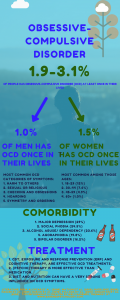What is Obsessive-Compulsive Disorder?
For some, having their apartment clean is an absolute must. For others, wearing clothes more than once or not showering everyday can seem disgusting and unhealthy. But where do we draw the line between being very picky and neat, and have an Obsessive-Compulsive Disorder? In many cases, people can misdiagnose themselves or others with Obsessive-Compulsive Disorder (OCD) if they or someone they know is very preoccupied with cleanliness or order. But is it really the same? For people with Obsessive-Compulsive Disorder, cleanliness, orderliness, or repetitive behaviours are more than pet-peeves or habits; they’re crippling and invasive problems that cause the person severe anxiety and often spiral out of control.
Obsessive-Compulsive Disorder (OCD), formally considered an anxiety disorder, is now regarded as its own unique condition. OCD causes the sufferer a great deal of stress and anxiety, in both their daily lives and their relationships. The true mark of OCD is the level at which the sufferer’s life is interfered with and hindered by the reoccurring thoughts (obsessions) and/or behaviours (compulsions), that both cause and soothe their feelings of anxiety. The treatment for OCD ranges from different medications to psychotherapy, with a combination of the two often being used that best suits the sufferer’s needs. For the sake of straightforwardness, this website has placed Obsessive-Compulsive Disorder within its previous category of Anxiety Disorders.
Jump to:
- What are the OCD causes?
- Diagnosing OCD.
- OCD treatment options.
- The OCD self-test.
- Coping with OCD.
- Living with someone with OCD.
- Interesting OCD facts.
- Online counseling for OCD.
- Take me to the homepage.
At Barends Psychology Practice treatment for Obsessive-Compulsive disorder is offered (also online). Go to contact us to schedule a first, free of charge, first session. (Depending on your health insurance, treatment may be reimbursed).
Obsessive-Compulsive Disorder – Definition and Symptoms
Obsessive-Compulsive disorder is a severe and disabling condition, made up of either obsessive thoughts, compulsive ritual behaviours, or both. The symptoms of OCD are as follows:
Obsessions
Obsessions within Obsessive-Compulsive Disorder are made up of four essential components, which must be present for the patient to be considered to have OCD.
- Thoughts are reoccurring and persistent, with impulses and images being experienced as intrusive and causing great anxiety.
- These thoughts are not just excessive worries about real life problems.
- The sufferer tries to suppress, ignore or neutralize the unwanted thoughts by forcing other thoughts or actions.
- And that the sufferer recognizes that these thoughts are produced by their own mind, and not caused by a true threat.
Examples for obsessive thoughts include unwanted thoughts of harming loved ones, fears of having not turned off appliances, fears of being unclean or contaminated, and intrusive sexual or violent thoughts that the person doesn’t want.
(Advertisement. For more information, please scroll down.)
Compulsions
Compulsions are repetitive actions (door locking or hand washing) or mental acts (counting or praying) that the sufferer feels they must do in response to their obsession.
For the sufferer, the compulsions act to sooth the anxiety caused by the obsessions, and gives them a sense of relief. They often believe that in acting out these compulsions they can prevent some dreaded event. However, these actions are excessive and do not realistically connect with what they are intended to do.
Recent research has found that OCD sufferers tend to have obsessions and compulsions that have been categorized into 5 main groups:
- Obsessions about being responsible for causing or not preventing harm; compulsive checking and need for reassurance.
- Obsessions with symmetry; compulsive order and counting rituals.
- Obsessions with contamination; compulsive washing and cleaning rituals.
- Repulsive obsessions about violence, sex and religion.
- Obsessions with collecting or keeping items; compulsive collecting behaviours.
To find out how Obsessive-Compulsive Disorder is treated, go to OCD Treatment page

